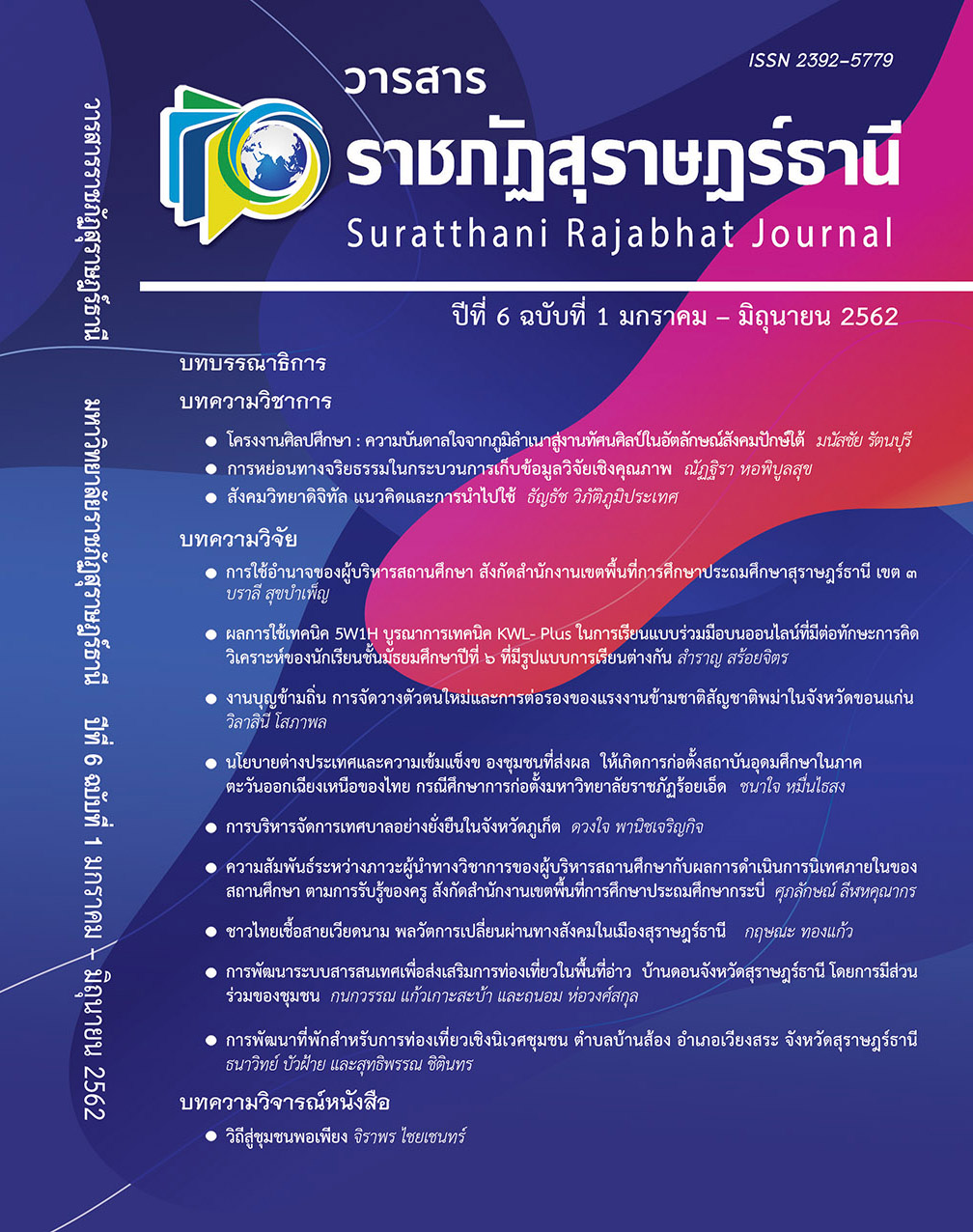The Compromising of Ethical Ideals in Gathering Qualitative Research Data
Main Article Content
Abstract
The article intended to study only the data gathering and environmental contexts of the qualitative research to know whether the degree of ethical ideals can be compromised with the methods of collecting qualitative data and environmental contexts. Reviewing various literature written in English during the 1960s to date occurred in order to understand the concept of ethical ideals in gathering data and the universal perspective on ethical ideals for doing qualitative research. Then the Thai cases were added to elaborate the understanding in the Thai context. It can be concluded that the ethical ideals in collecting research data could be harmed by deception during collecting data. Researchers must be able to explain the reasons for their use in order to gain ethical approval. For environmental contexts, the discourse that this research is beneficial for the community was used. Also, the cultural differences between the researcher and the key informants affected the privacy concept which was considered to be the ethical ideal for gathering data for qualitative research.
Article Details
References
Barnes, J. A. (1979). Who Should Know What?. Middlesex, Penguin books.
Bourdieu, P. (1996). Understanding. Theory Culture & Society, 13(2), 17-37.
Bryman, A. (2004). Social Research Methods. Oxford, Oxford University Press.
Bulmer, M. & Warwick, D., P. (1983). (Eds.) Social Research in Developing Countries: Survey and Censuses in the Third World. Bath, John Wiley and Sons Ltd.
Burton, D. (2000). Research Training for Social Research. London, Sage.
Chatzifotiou, S. (2000). Conducting Qualitative Research on Wife Abouse : Dealing with the Issue of Anxiety. Sociological Research Online, 5(2). Retrieved from http://socresonline.org.uk/5/2/chatzifotiou.html.
Grover, S. (2004). Why Won’t They Listen to Us? On Giving Power and Voice to Children Participating in Social Research. Childhood, 11(1). 81-93.
Hammersley, M. & Atkinson, P. (1983). Ethnography Principles in Practice. London : Tavistock Publications.
Hofstede, G. (1980). Culture’s Consequences: International Difference in Work Relateds Values. Bavery Hill, Sage.
Homan, R. (1991). The Ethics of Social Research. London, Longman.
Jones, R. F. (2006). Participant Observation (Handout). Canterbury University of Kent.
Kahn, F. P. et. al. (1998). Beyond Consent: Seeking Justice in Research. Oxford : Oxford University Press.
Kent, J. et. al. (2002). Social Science Gets the Ethics Treatment: Research Governance and Ethical Review. Sociological Research Online, 7(4). Retrieved from http://socresonline.org.uk/7/4/williamson.html
Kimmel, A. (1988). Ethics and Values in Applied Social Research. London,
Sage.
May, T. (1997). Social Research: Issues Methods and Process. Buckingham : Open University Press.
Murray, S.B. (2003). A Spy, a Shill, a Go-Between, or a Sociologies: Unveiling the ‘Observer’ in Participant Observer. Qualitative Research, 3(3). 377-396.
National Commission for the Protection of Human Subjects of Biomedical and Behavioral Research, Department of Health, Education and Welfare (DHEW) (1978). The Belmont Report. Washington D.C., United States Government Printing Office.
Nitipaparnan, T. (2015). The Production of Cultural Space for Tourism: A Case Study of Plernwarn Hua Hin District, Prachuabkirikhan Province, Bangkok, Integrated Science College of Interdisciplinary Studies, Thammasat University. (In Thai)
Prasasitratanasil, P. (2559). Research Ethics Online (online), Retrieved from http://www.priv.nrct.go.th/ewt_dl.php?nid=1426 (In Thai).
Pryke, S. (2004). Some of Our People Can Be the Most Difficult, Reflections on Difficult Interviews (online). Sociological Research Online, 9(1). Retrieved from http://socresonline.org.uk/9/1/pryke.html.
Punch, K. F. (2005). Introduction to social research. London, Sage.
Reynolds, P, D. (1982). Ethics and social science Research. London : Prentice Hall.
Renzetti, C.M & Lee, R.M. (1993). (Eds.) Researching Sensitive Topics. London, Sage.
Sapsford, R. & Jupp, V. (1996). (Eds.) Data Collection and Analysis. London, Sage.
Shaffir, W. B. & Stebbins R.A. (1991). (Eds) Experiencing Fieldwork: An Inside View of Qualitative Research. London, Sage.
Styrdom, P. (1999). The Challenge of Responsibility for Sociology. Current Sociology. 47(3). 65-88.
Swain, J. et. al. (1998) Public Research, Private Concerns: Ethical Issues in the Use of Open-Ended Interviews with People Who Have Learning Difficulties. Disability and Society. 13(1). 21-36.
Williams, M. (2003). Making Sense of Social Research. London, Sage
Wongsuparp, S. (N.) (1994). The Process to Become Massage Parlour. Bangkok, Thammasat University. (In Thai)
www.krisdika.go.th (2007) Research on Human Online (online). Retrieved from www.krisdika.go.th/Naturesig/CheckSig?whichLaw=law2&folde rName=%ca27&lawPath=%ca27-2i-2550-a0001. (In Thai)


